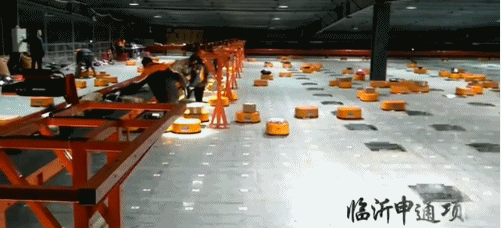
A video featuring hundreds of orange robots sorting packages, scuttling across a factory platform like an army of ants, went viral in China over the past week.
The scenes were shot at a factory belonging to the delivery firm STO Express.
"These robots can sort as many as 18,000 items in one hour," said one factory employee. "They also weigh the items, and plug themselves to charge when their batteries are running low."
The footage offers a glimpse into the future, as China has thrown its weight behind the application of artificial intelligence (AI) across all sectors.
Back in March, Premier Li Keqiang presented the government work report to the Fifth Session of the 12th National People's Congress, AI was included for the first time.
"We will accelerate R&D and commercialization of new materials, artificial intelligence [...] and develop industrial clusters in these fields," the report read.
"It's good news for AI companies and researchers," said Liu Qingfeng, chairman of iFlytek, which is known for its voice recognition products.
"More and more excellent startup AI companies will emerge, and more private funding will [flow to] the AI market," he added.
In fact, the wheels of AI development were already in motion before the government gave the sector its seal of approval. On March 3, just days before Li presented the work report, Internet giant Baidu received approval from the National Development and Reform Commission to establish a national deep learning technology lab. This project is set to vastly improve research into and application of deep learning and AI.
In November 2016, Baidu partnered with telecom company China Unicom to explore the application of AI in online and offline services.
Lu Qi, group president and COO of Baidu, said it was an honor for the company to play an active role in a nationally important sector.
Tencent is also expanding its portfolio to include AI. Through its acquisition of a five percent stake in Tesla in late March, it seems to set up the ante and establish itself as a player in the area of self-driving cars.
Despite the brouhaha surrounding a future with AI, some people are discouraged by the prospects of tomorrow's world. Many members of the public have turned to social media to air their grievances.
One Weibo user, "Sally," said that the shift toward automation was to blame for rising unemployment.
Another user, "Cjhwjw," questioned the effectiveness of the STO Express robots, pointing out that human workers were still needed to place the packages onto the robots.
Another area where people are mixed about AI is its application in popular games, such as Go.
On Monday, it was confirmed by the Chinese Weiqi (Go) Association that Ke Jie, the current number-one professional go player in the world, will take on AlphaGo, Google's AI program, in May.
The news was met by a mixed response by AI enthusiasts and Go lovers, many of which were still sore about AlphaGo's 4-1 victory over South Korean master Lee Se-dol in March 2016.
Despite the concerns, Jack Ma, chairman of Alibaba Group, which has also invested heavily in AI, was quick to dismiss any potential "threat" from AI.
"It's not surprising that AI does some things better than we do," Ma said at the China IT Summit in Shenzhen last Sunday. "If someday AI does something we've never done, that will be something notable."
"People tend to underestimate the impact of technology in the long term, while overestimating the impact in short term," according to Zhang Yaqin, president of Baidu.
Zhang spoke about the "hype and frenzy" surrounding AI, the concerns about where AI was headed, and if our lives would change drastically in a short amount of time.
"It takes time and patience," Zhang said about the development and application of AI into our everyday lives.
His sentiment resonated with Tan Tieniu, vice president of the Chinese Academy of Sciences.
"People are expecting too much at the moment," he said. "Companies should focus on discovering more fields for AI to thrive, rather than blindly investing."
Overall, most practitioners were upbeat.
"The Internet is just an appetizer," said Robin Li, chairman of Baidu. "The main course will be AI."
"In five to ten years, AI will be as common as water and electricity, and used in almost all industries," Liu Qingfeng said.
As for concerns that AI might replace humans, Zhang Yaqin was optimistic.
"After each of the industrial revolutions, there were always the associated 'pains'," Zhang said. "But, overall, [these shifts] actually created more jobs, and made humans more productive."
"We need to be aware of these issues, [and plan for] new opportunities and new jobs that are more valuable and of higher quality," he added.


















































